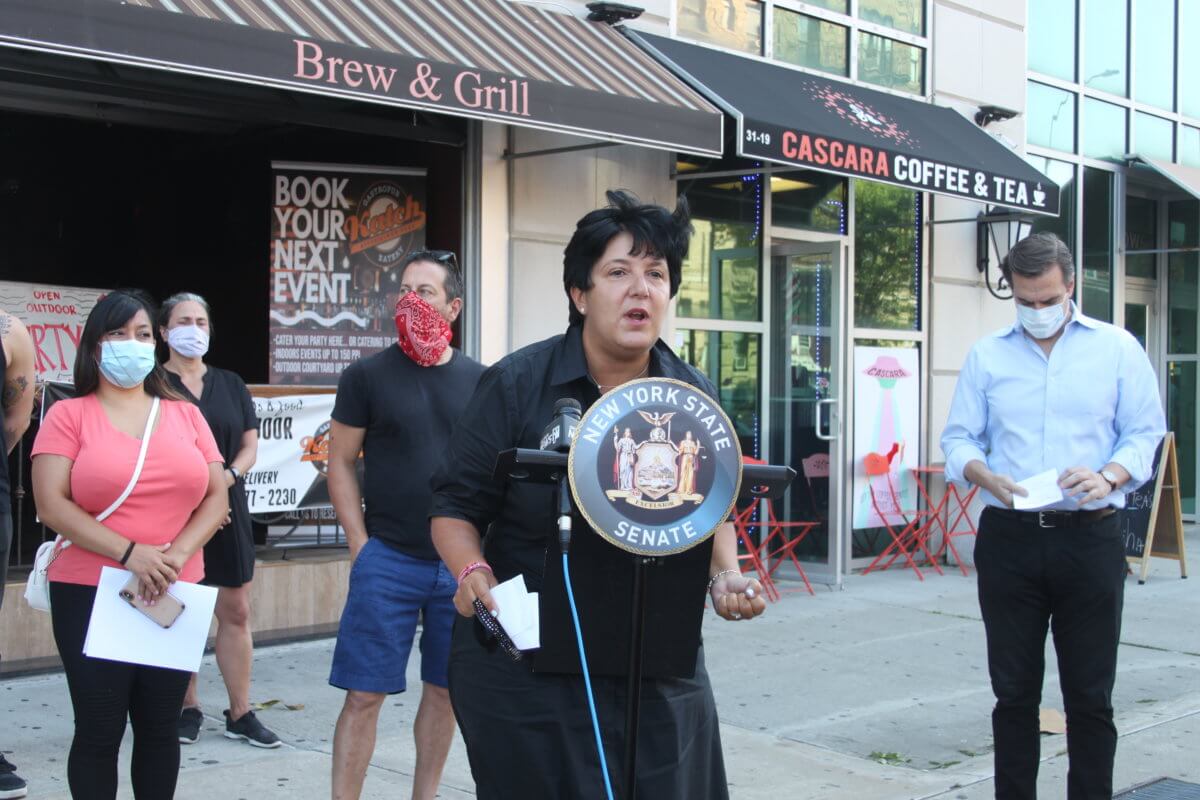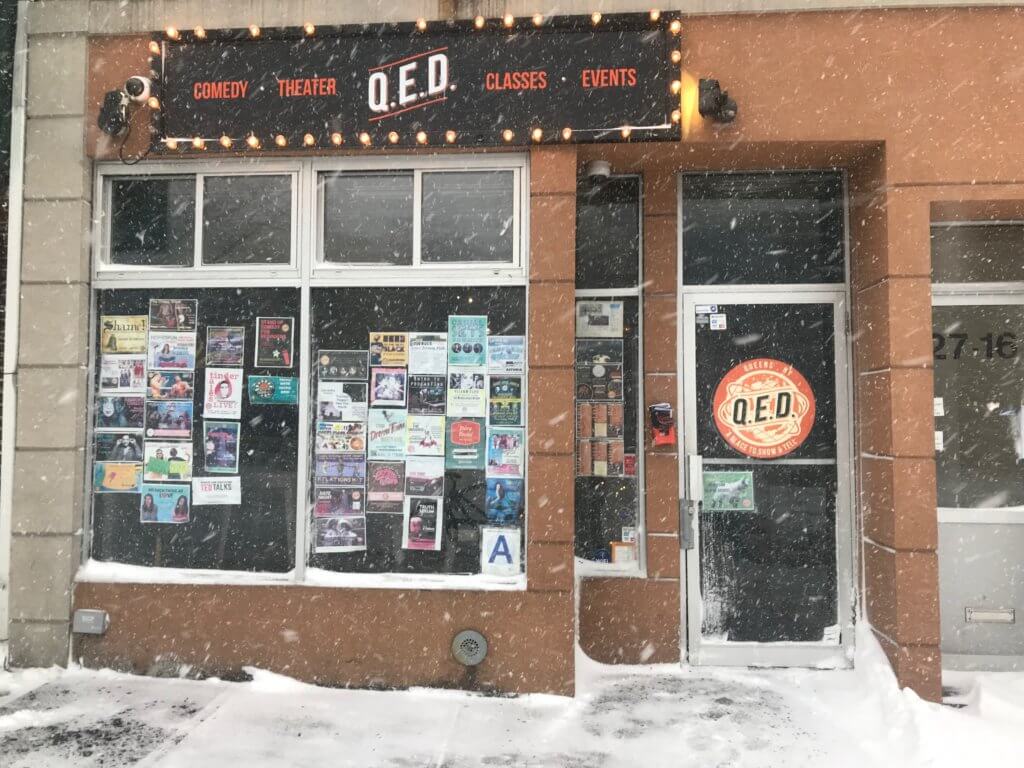President Donald Trump finally signed the much awaited and disputed COVID-19 stimulus package before the Monday, Dec. 28, deadline, but small business owners in Queens aren’t as enthusiastic this time around.
The $900 billion stimulus package, a 5,000-page legislation that has been in negotiations for months, has many measures including relief checks, unemployment benefits, an evictions moratorium extension and $284 billion for the Paycheck Protection Program (PPP)’s “Second Draw.”
“The small business owners I’m in touch with have this sense that it’s too little, way, way, way too late,” said Jaime-Faye Bean, executive director of Sunnyside Shines Business Improvement District. “I have places that are closing as of Dec. 31. If they had access to several rounds of PPP or other aid, the outcome may have been different.”
For months, small businesses in Queens have called for help in the form of grants, tax breaks and rent relief in order to survive the pandemic. With a second wave already underway in New York City and restrictions imposed by Gov. Andrew Cuomo, such as an indefinite stop to indoor dining, some businesses feel they’re running out of time.
“I’m thankful it passed, I think all businesses are happy about it,” said Roseann McSorley, co-owner of Katch Astoria and leader of Sen. Michael Gianaris’ western Queens business committee. “But there’s a small business crisis right now. Even though it passed, it’s going to take a while to get it.”

It may take the administration a few weeks to begin distributing the aid, but some are hopeful that the trial and errors of the PPP program from months past will make for a smoother rollout.
However, McSorley was disappointed that the Restaurants Act, a bipartisan bill that would provide $120 billion in grants to small bars and restaurants to make up for lost revenue due to the pandemic, wasn’t in the stimulus package.
Thomas Grech, the president of the Queens Chamber of Commerce said about 1,000 out of nearly 6,000 restaurants in the borough have permanently closed since March. He anticipates even more restaurants will close after the holidays, a time when eateries would normally make most of their profit.
“It’s completely unacceptable, and unbelievably does not include the Restaurants Act. While I understand provisions of legislation include funds for PPP loans, the Restaurants Act, a bipartisan piece of legislation offered direct grants — not loans — to restaurants. We expect further closings and displacement of many of Queens beloved food institutions.”
In terms of retail, Grech believes it’ll continue to see challenges with lockdowns, but may receive help from the PPP.
Bean, who noted the retail industry was already experiencing hard times before the pandemic, has seen some of the few local retailers in western Queens have a relatively good year due to the recent months’ push to shop small and local.
“It’s been a mixed bag,” said Bean. “The problem is not all retail is trendy. We need the government to help those that don’t fit that way but the neighborhood still needs.”
The administration made some updates to the PPP program, after months of advocacy from small business owners, such as a maximum loan amount of $2 million (down from $10 million) for companies that employ less than 300 people (down from 500 people), according to Forbes.
Eligible businesses still must spend 60 percent of their loan on payroll, and 40 percent on other expenses. While the original PPP was mainly intended for payroll and in some cases rent, the new version allows for the other portion to be used on other expenses, such as personal protective equipment.
The loans are tax exempt and businesses may also apply for loan forgiveness if compliant with guidelines.
But Shawn Dixon, owner of Otis and Finn Barbershop with locations in Long Island City and Greenpoint, said business owners’ “hands are tied” due to the 60 percent restriction on payroll.
“New York City is different from other places in that rent is our biggest cost. I understand the first time around was to keep unemployment rates low, but it made it more difficult to keep our workers,” said Dixon. “As business owners, our first priority is the people who work for us, but if you’re going to give people this money they can’t use on other expenses, it doesn’t make sense. We want to help them but we need to make money and pay our bills.”
He added that it’s difficult to follow guidelines that are, essentially, still being written and revised. Dixon, who noted several of his competitors have already shut down for good, believes that what businesses really need is rent relief.
“The only real way out for everybody, small businesses and tenants, is rent relief,” said Dixon. “It’s the last thing politicians want to do but it’s what we need.”
The stimulus package also includes $15 billion for live venues, independent movie theaters and cultural institutions, through the Save Our Stages Act.
Kambri Crews, founder of Q.E.D. in Astoria, said that while she’s grateful the stimulus includes Save Our Stages, she’s jaded about the process and unsure whether it’ll make a significant enough difference for her performance venue.
“If we don’t get it, I don’t think we could stay open. I’m out of money,” said Crews, who opened Q.E.D. six years ago. “Q.E.D. had a flush bank account, zero debt, and now that’s all wiped out. I used my life savings to open Q.E.D.; I don’t want to go into more debt.”

Cultural institutions in NYC have been closed and making zero revenue for nine months, with no opening date in sight. Some have gotten creative with virtual entertainment or relied on donations, but, unlike restaurants, aren’t allowed to host ticketed events outdoors yet.
As a result, beloved places like The Creek and The Cave in Long Island City have permanently shuttered.
“The reason why this act is so important for theaters and communities is because they fuel the economic ecosystem for entire neighborhoods,” said Crews. “For every dollar spent at one of these venues, an additional $12 is spent somewhere nearby. When you fuel the arts, that fuels all restaurants, bodegas, Uber, MTA. Not just in New York City; it’s true of every community.”
Sheila Lewandowski, co-founder and executive director of the Chocolate Factory Theater in Long Island City, said she might not qualify for the Save Our Stages Act as a nonprofit, but is hopeful of another PPP loan.
“We got ours in April. It was so critically important to us surviving. We paid all our artists because of the precarious situation they’re in, all our staff, health insurance … It really made the difference,” said Lewandowski, noting that more of the loans should be forgivable.
Lewandowski also couldn’t help but think about the $600 relief checks and how it isn’t enough for their artists and other workers to sustain themselves until they can go back to work.
Dorothy Stepnowska, owner of Flower Power Coffee House and president of the Glendale Chamber of Commerce, said that more of these resources need to be accessible to immigrants and those whose first language isn’t English.
“I think cities should have reps contacting small businesses and educating them about this money. You have a lot of immigrants that have no clue what’s going on,” said Stepnowska, adding that Chambers of Commerce do help but more outreach is needed. “Lots of immigrants don’t have access to this or know how to find it. It’s nice to see, but I think there should be more people going out there and talking to them.”
Stepnowska said immigrant businesses already struggled to keep up with state and city guidelines, and this unprecedented time adds to those challenges.
“People want to work, though; they don’t want aid,” Stepnowska added. “But we can’t work if everything is closed.”
Tamykah Anthony, an Astoria small business owner, isn’t sure she qualifies for this round of PPP or the Economic Injury Disaster Loan (EIDL). She received an EIDL months ago that somewhat helped, she said, but has found it difficult to use toward her different business endeavors due to the uncertain times.
“It’s a scary time for business owners,” she said.
As a homeschool mom of two, Anthony added that a $600 check (which may increase or decrease depending on how many dependents or how much an individual earned in 2019), is “barely a bandaid.”
“It’s definitely not enough but I’m not sure what number would be enough at this point. Most people are already in dire financial positions from the effects of the pandemic and $600 is barely a bandaid to hold them over,” said Anthony. “I think the deeper issue is there is no ‘larger plan’ to help the economy, meaning I don’t see any financial planning resources to help us with HOW we could collectively or individually use the money (whatever amount it is) to benefit individual families, businesses and communities. I’ve seen articles suggesting that folks should be saving their stimulus checks for ‘rainy days’ and it seems ludicrous to me considering that we are currently in nine months of ‘rainy days.’”
One of the reasons why Trump decided to delay signing the stimulus package was because he wanted to increase payments to $2,000, which several of Queens’ Representatives and the Democratic-led House supports. On Tuesday, Congress will vote on higher relief checks.





































